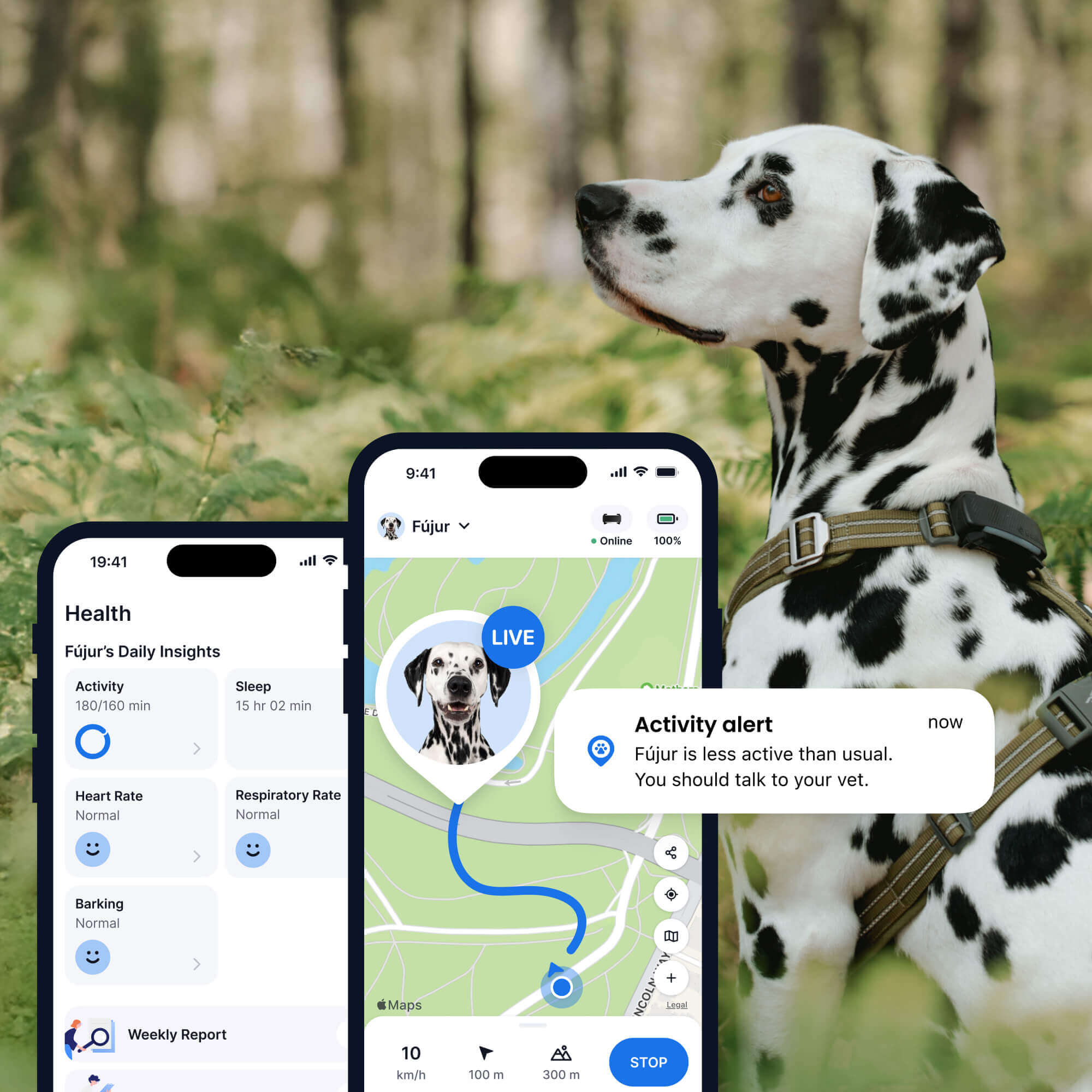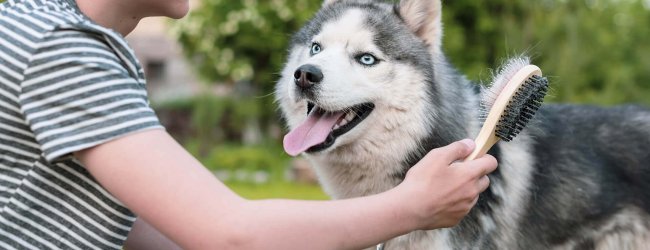 Approved by Dr. Dwight Alleyne, DVM
Approved by Dr. Dwight Alleyne, DVM Dog Twitching In Sleep? Why It Happens (And When To Worry)
Most of the time, a dog twitching while asleep isn't cause for concern. They might just be dreaming, trying to stay warm, or startled from a noise - or it could be the beginnings of a serious health condition. Here's how to tell the difference.
Ever snuggled beside your buddy around nighttime – and found your dog twitching or shaking every so often? Wondering: why is my dog twitching in his sleep? And why do dogs twitch in their sleep, anyway?
So let’s dive right in to the reasons your dog shakes in sleep, or if you’ve got an old dog shaking while lying down, or even if you’ve got a puppy twitching in sleep. (Plus, how your dog’s sleeping patterns can affect how often they twitch or not.)
Key Takeaways
It’s common for dogs to twitch, paddle their legs, or even vocalize during sleep. This typically happens during the REM (Rapid Eye Movement) stage, when they are likely dreaming.
Head to your vet if your dog exhibits intense, frequent movements, rigid limbs, or distress while sleeping. It could indicate a seizure or other medical issue.
Tractive’s GPS & Health Tracker includes vital signs and sleep monitoring, helping you understand your dog’s sleep quality and breathing and heart rate – so you can spot the signs of discomfort, stress, or hidden health issues early.

Always know your buddy is healthy & safe
Read moreWhy do dogs twitch in their sleep?
Now, to start off, a dog twitching or even shaking occasionally during sleep is 100% normal. However, in some cases, your dog’s nighttime twitching or shaking might also be due to health issues. (Especially for senior dogs.) And left untreated, these could severely and negatively impact your buddy’s health for the long term.
So let’s dive into each of these, one by one. Your dog might be twitching in their sleep because…
- Their brains are active
Even during sleep. Much like cats, dogs sleep around 12-14 hours per day. The twitching could mean their brains are working through a dream cycle – but “shut down” their muscles. - They’re growing up
A growing puppy’s brain hasn’t 100% finished developing yet. Which can keep it “busy” during sleep and turn up as occasional twitching or shaking. - They’re growing older
In senior dogs, on the other hand, their brains might be weakening due to age.1 Which might turn up as twitching or even shaking occasionally while asleep. - Your dog’s sleeping position
If your dog tends to sleep stretched out or on the side, they’re more likely to relax – so they might twitch more as a result. But if your dog tends to sleep all curled up, this might prevent them from relaxing completely. So they might actually twitch less as a result. - Your dog’s feeling cold
If your dog’s all curled up while sleeping, it’s likely they’re trying to save body heat. I.e., they’re cold and their twitching could be a way for them to keep warm.2 - There’s noise in the environment
If there’s a storm raging outdoors, your partner’s vacuuming the living room, or your neighbors are getting festive with their 4th of July fireworks – your dog is still likely to pick up on these sounds, even if asleep.3
Should you wake up your dog if they’re twitching in their sleep?
In general, vets recommend not waking up your dog if they’re twitching in their sleep – unless they’re showing signs of distress.4 (Which we cover a little further below.) If your dog is having a nightmare, it might be heart-wrenching to hear them whimpering in their sleep or shaking or twitching. But it’s best to avoid touching them or waking them up.
Why? Because a dog that’s in dream-time sleep can take a while to fully wake up. Which means that if you wake them up midway, they might bite or scratch you in fright. So rather than touching them, try and softly call your dog’s name instead. This can help them feel assured that you’re nearby and that they’re safe. Only engage with them once your dog seems at least somewhat awake.
My dog shakes in their sleep – could it be a health issue?
Besides these reasons, a dog shaking in sleep or twitching occasionally might also be due to health concerns.5 Including seizures, but also:
- A viral or bacterial infection
- Poisoning, like if your dog’s eaten something they shouldn’t have
- Blood sugar issues – including diabetes and low blood sugar
- Kidney, liver, or heart conditions
- Arthritis
Read more:
- What Can Dogs Not Eat? 15 Foods Poisonous To Dogs
- Toxic To Dogs: Dog Parents Beware Of These Common Dog Poisons
- The Danger Of Snail Bait For Dogs
Dog twitching in sleep…or seizure?
Your dog is more likely to have a seizure while awake. But it is possible their sleep-time twitching might occur as a result of a seizure as well.6 So here are the key differences between regular twitching- and how to identify if they’re having a seizure instead:
| Regular sleep | Seizure | |
| Body | Flexible, relaxed | Stiff |
| Breathing | Normal, occasionally irregular | Labored |
| Eyes | Partially or completely closed | Wide open, but not reacting |
| Consciousness | Your dog will respond to your voice and wake up easily | Your dog might lose consciousness and not respond to your voice |
Besides these signs, a seizure in dogs might also include signs like:7
- Vomiting
- Foaming at the mouth
- Loss of urine or bowel movements
- Your dog seeming dazed and disoriented
- Drooling and panting
Read more: Why Is My Dog Throwing Up? 8 Reasons Why & What To Do
When should you get your dog to a vet?
If your dog is only twitching every so often, it’s no cause for concern and is 100% normal. But you should consider heading to the vet if you notice:
- Your dog’s shaking and twitching beginning to interfere with their sleep
- If their twitching seems to affect their full body, like a tremor – and your dog seems to go completely rigid for longer than just a few moments8
Because with time, your dog’s nighttime twitching might end up with them:
- Unable to fall asleep
- Unable to stay asleep – as they keep waking up from the twitching
⚠️ All these can prevent your dog from getting the quality sleep they need to grow, heal from infections and injuries, and overcome sickness. Which, over time, can make them more likely to fall sick – and stay sick. Reducing the time they could otherwise spend by your side, living their happiest, healthiest life.
Where a smart dog tracker with Health Monitoring steps in
Keeping track of your dog’s sleep might sound easy on paper. But how are you supposed to monitor your dog’s every twitch, snore, or sleepy shuffle – when you’ve got to get your own sleep? That’s where a smart dog tracker with Health Monitoring can save you time, energy, sleep – and a ton of money you might otherwise spend on vet bills instead.
With its built-in motion detector, your trusty Tractive device picks up on your dog’s sleep patterns over time. Which can help you figure out:
- How much is a normal amount of sleep for your dog
- How much quality sleep they’ve gotten overnight
- How often their sleep was disturbed (whether from twitching or not)
- Your dog’s vital signs – like their breathing and heart rate
- And any weird change in your dog’s sleep – in which case you’ll get a Health Alert, warning you.
So you can catch on to a change quicker, get your dog over for a check up on time – and spot potential health issues before they have a chance to worsen.

Get health alerts for your dog
Our pups can’t always tell us if something’s wrong. But if their tracker detects unusual changes in their routine, you’ll get an alert, helping you catch potential issues early.
Your furry friend’s health and wellbeing means as much as to us as it does to you. So we’ve made it a priority to only share medically-relevant content on our blog. This post was checked, double-checked, and medically verified by Georgia-based vet, Dr. Dwight Alleyne.

Dr. Dwight Alleyne, DVM
Originally from Long Island, New York, Dr. Alleyne began his career at a no-kill animal shelter before becoming a licensed veterinary technician. He graduated from Cornell University Veterinary College in 2006 and completed an internship at Purdue University. Now practicing in Georgia, Dr. Alleyne specializes in soft tissue surgery and ultrasounds. He also writes pet health articles on his website, “The Animal Doctor Blog” (www.anmldrblog.com).




